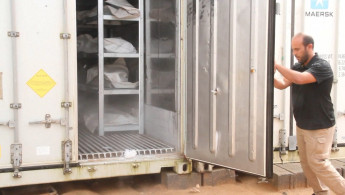Islamic State corpses in Libya await fate in Misrata containers
 |
|
In August, British Foreign Secretary Boris Johnson said Libya could one day become a magnet for tourists and investors once it can "clear the dead bodies away", drawing widespread condemnation internationally and within Libya.
According to Tuwaileb's estimate, between 1,500 and 2,000 militants were buried in the Mediterranean city.
No claims to the bodies
"We don't have enough fridges, or we would have exhumed all the bodies," said the Libyan official, who pointed out that the containers were loaned by private companies.
Out of the seven refrigerated containers in Misrata, three have broken down. "We've had to redistribute the bodies among the fridges that still work," said Tuwaileb.
It is especially difficult during the summer due to constant power cuts. "So a backup has to be ready and we have to refuel it regularly," he said.
Each white body bag is numbered and classified with its own file, including DNA samples, documents and other evidence collected with each body.
All the files have been transferred to the prosecutor general's office in Tripoli to decide if and where the bodies are to be buried.
Most of the dead militants came from Tunisia, Egypt and Sudan, with some from Libya, but no families have come to Misrata to claim them.
"We don't know if countries have contacted the prosecutor general to recover the bodies of their nationals, but as far as we're concerned nobody's come here to try to identify the bodies," said Tuwaileb.
Shipping the bodies to home countries would be sensitive for governments involved, who are wary of acknowledging how many of their citizens fought for the Islamic State in Libya, Iraq and Syria.
In the meantime, the bodies will remain in Misrata. But some of the companies who lent out refrigerated containers want them back, Tuwaileb said.
"Every time I tell them they can take the fridges if they want, but with the contents."





 Follow the Middle East's top stories in English at The New Arab on Google News
Follow the Middle East's top stories in English at The New Arab on Google News
![The UAE is widely suspected of arming the RSF militia [Getty]](/sites/default/files/styles/image_330x185/public/2024-11/GettyImages-472529908.jpg?h=69f2b9d0&itok=Yauw3YTG)
![Netanyahu furiously denounced the ICC [Getty]](/sites/default/files/styles/image_330x185/public/2024-11/GettyImages-2169352575.jpg?h=199d8c1f&itok=-vRiruf5)
![Both Hamas and the Palestinian Authority welcomed the ICC arrest warrants [Getty]](/sites/default/files/styles/image_330x185/public/2024-11/GettyImages-2178351173.jpg?h=199d8c1f&itok=TV858iVg)